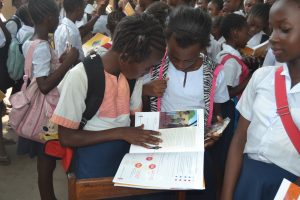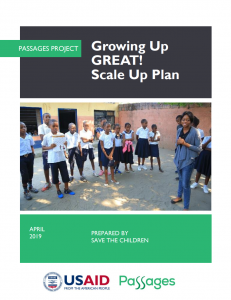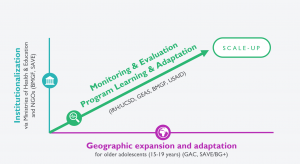During Phase 4, Preparing to Scale, the project team undertook activities to:
With data on intervention effectiveness and cost gathered in Phase 3 and the initial scale-up plan started in Phase 1, in August 2018, GUG leaders jointly reviewed:

Quantitative evaluation findings from the Global Entry Adolescent Study (GEAS) indicated significant improvements among very young adolescents (VYAs) who participated in GUG activities in knowledge of puberty and reproductive health, developmental assets, and gender-equitable attitudes. Findings from the GEAS survey and the youth-led participatory evaluation also suggested that  caregivers and community members who engaged in GUG group discussions demonstrated more gender equitable behaviors towards and connectedness with VYAs.
caregivers and community members who engaged in GUG group discussions demonstrated more gender equitable behaviors towards and connectedness with VYAs.
After closely reviewing the evaluation results, the costing data (which estimated $100 for each GUG toolkit), the CORRECT attributes, and the CBOs’ implementation experience, members of the SRG, the GUG consortium, and key government stakeholders decided to scale the intervention, albeit with several modifications.
The intervention was adapted to increase success at scale, including adjustments to the video discussion guides for caregivers to strengthen content on open and respectful communication with VYAs and non-violent discipline, a topic participants often requested during the Pilot phase.

Between February and April 2019, Save the Children held technical consultations with focal points in the Ministry of Health (MOH)’s National Adolescent Health Program and the Ministry of Primary, Secondary, and Vocational Education (MOE)’s Family Life Education Directorate to develop the Growing Up GREAT! Scale-up Plan. This document describes the scale-up decision-making process and outlines the guiding principles for the expansion and institutionalization of GUG. Expansion (horizontal scale-up) efforts increased the scope of the intervention to include health system strengthening work and extended the intervention to reach new geographic areas and older adolescents (15-19 years) in addition to VYAs. These horizontal scale-up efforts were supported by Bien Grandir Plus! (BG+), a three-year investment from Global Affairs Canada through Save the Children Canada. Institutionalization of GUG into the MOE, MOH, and local organizations (vertical scale-up) was led by Save the Children and the Center on Gender Equity and Health (via the Gates-funded Growing Up GREAT!: Adapting, Learning, and Scaling) and aimed to:
The team assessed progress towards horizontal and vertical scale via a series of scale-up benchmarks (see Phase 5). Steps taken towards horizontal and vertical scale in Phase 4 included: a Joint Training of Trainers of Ministry and CBO focal points for GUG/BG+ in April 2019, development of a school club protocol, and issue of a Circulaire (legally binding regulation) by the EPST on establishing extracurricular school clubs, including GUG clubs.
In December 2019, GEAS began to measure longer-term post-intervention effects via a third wave of data collection. The team added new measures to assess additional gender norms dimensions, gender identity and expression, gendered behaviors, and personal aspirations. Nearly 80% of baseline participants (n=2,221; 78% follow-up rate) were reached at Wave 3. Notable longitudinal results included sustained intervention effects in gender-equitable attitudes about gender equality in household chores among all adolescents and knowledge of where to get information about menstruation among in-school girls. Among out-of-school adolescents, sustained intervention effects were observed on caregiver connectedness and VYA communication about contraception.